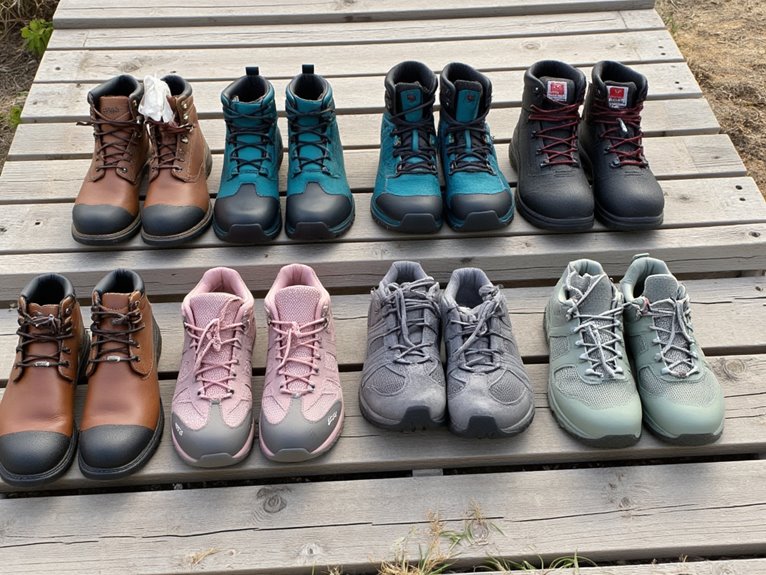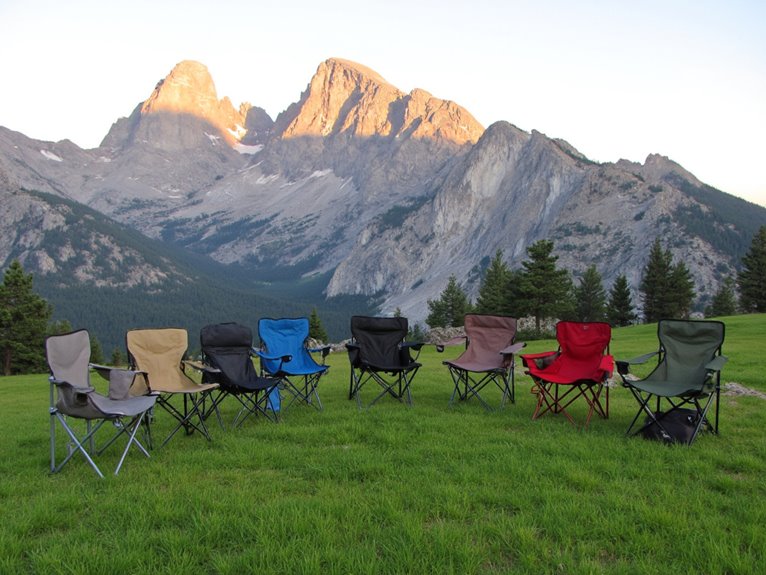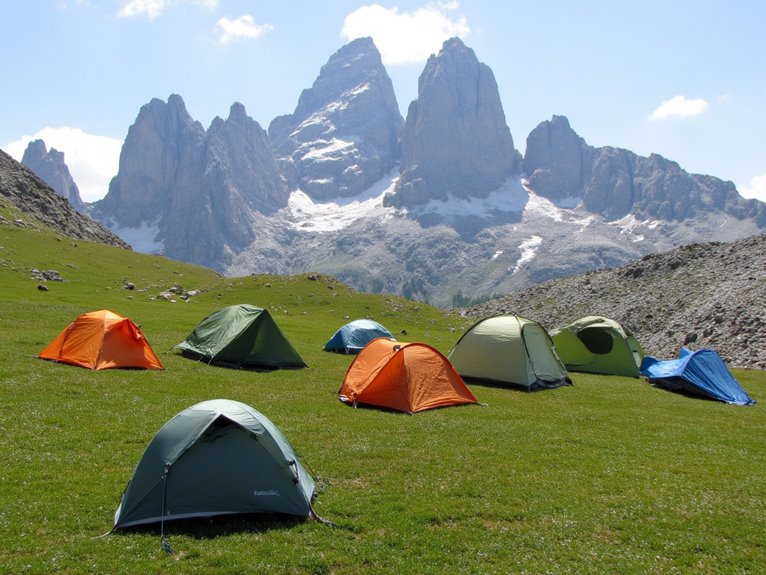What Food to Bring Camping Without a Fridge?
When camping without a fridge, opt for energy-rich snacks like nuts, seeds, and dried fruits, as well as protein-packed options like jerky, canned tuna, and energy bars. Non-perishable breakfast options include cereal and granola bars, and energy-dense oatmeal packs. Canned goods like beans, tomatoes, and corn provide versatile meal options. Dried fruits and nuts offer natural sweetness and crunch. Ready-to-eat meals like freeze-dried entrees and MREs provide convenience and lightweight solutions. By choosing these options, you'll stay energized and satisfied on the go – and discover how to tailor your food choices to your camping needs.
We are supported by our audience. When you purchase through links on our site, we may earn an affiliate commission, at no extra cost for you. Learn more. Last update on 18th January 2026 / Images from Amazon Product Advertising API.
Energy-Rich Snacks for Camping
Camping trips often require sustained energy levels, making energy-rich snacks an essential component of a well-planned camping diet.
Nuts, seeds, and dried fruits are excellent choices, providing a natural energy boost. Trail mix with a combination of nuts, seeds, and dried fruits is a satisfying snack that's easy to prepare.
Energy bars, such as Clif Bars or Granola Bars, are also a convenient option. Jerky, either beef, turkey, or chicken, is a protein-rich snack that's easy to pack and doesn't require refrigeration.
Finally, consider packing energy-dense snacks like peanut butter or almond butter, which can be paired with crackers or eaten straight from the jar.
These snacks will help maintain energy levels throughout the camping trip.
Non-Perishable Breakfast Options
In terms of non-perishable breakfast options for camping, it's essential to prioritize convenience, shelf life, and nutritional value.
Two excellent choices are cereal and granola bars, which provide a quick and easy breakfast that can be easily stowed away in a backpack.
Additionally, energy-rich oatmeal packs are another great option, offering a warm and comforting start to the day with minimal fuss and preparation.
Cereal and Granola Bars
Among the most convenient non-perishable breakfast options for camping trips are cereal and granola bars, which require minimal preparation and can be easily stowed away in a backpack. These compact breakfast staples are ideal for camping, as they are lightweight, easy to consume on-the-go, and provide a quick energy boost to start the day.
When selecting cereal and granola bars, consider the following:
- Look for compact packaging to save space in your backpack.
- Choose bars with a long shelf life to guarantee they remain fresh throughout your trip.
- Opt for bars with a high caloric content to provide sustained energy throughout the morning and confirm you're well-fueled for the day ahead.
Energy-Rich Oatmeal Packs
Preparing hot oatmeal on a camping trip can be a challenge, but individual energy-rich oatmeal packs offer a convenient, non-perishable solution that requires minimal preparation and cooking.
These single-serve packets are specifically designed for camping and backpacking, providing a quick and easy breakfast option.
Look for brands that offer high-calorie content to help fuel your outdoor adventures.
When selecting an oatmeal pack, consider the flavor and ingredient options to verify they meet your dietary needs.
Some popular brands also offer added nutrients like protein or dried fruits to fortify the nutritional value.
Canned Goods for Camping Meals
Five essential canned goods that should be staples in your camping pantry are beans, tuna, chicken, tomatoes, and corn. These versatile items can be used to create a variety of meals, from hearty stews to simple salads.
Canned bean salads: Mix canned beans with diced veggies and a vinaigrette for a quick and easy side dish.
Tuna salad sandwiches: Combine canned tuna with mayonnaise, chopped onions, and diced celery for a protein-packed sandwich filling.
Chicken and rice bowls: Serve canned chicken over a bed of rice, with diced veggies and a sprinkle of soy sauce for added flavor.
Dried Fruits and Nuts for Camping
When packing for a camping trip, it's wise to balance out the savory canned goods with some sweet and crunchy snacks, making dried fruits and nuts a satisfying addition to your camping pantry.
Dried fruits like apricots, apples, and mangoes provide natural sweetness and chewy texture, while nuts like almonds, cashews, and walnuts offer a satisfying crunch.
Look for unsweetened and unsalted options to avoid added sugars and excess sodium. Store them in airtight containers to maintain freshness.
Trail mix made with dried fruits and nuts is a convenient snack that's easy to prepare and pack. Simply combine your chosen ingredients in a bowl, mix well, and portion out into individual servings for a quick energy boost on the go.
Protein-Packed Camping Food Options
Camping enthusiasts seeking sustained energy and satisfaction can turn to protein-packed foods that provide essential amino acids and other essential nutrients.
These foods are vital for maintaining energy levels during outdoor activities and supporting overall health.
Jerky: A convenient and compact snack made from dried and seasoned meat, providing up to 15 grams of protein per ounce.
Canned Tuna: Rich in protein and omega-3 fatty acids, canned tuna is a versatile and shelf-stable option that can be paired with crackers or eaten straight from the can.
Energy Bars: Look for bars with minimal added sugars and artificial ingredients, and opt for those with a balance of protein, carbohydrates, and healthy fats for sustained energy.
These foods are essential for maintaining energy levels during outdoor activities and supporting overall health.
Ready-to-Eat Meals for Camping
In terms of ready-to-eat meals for camping, it's essential to prioritize convenience, nutrition, and shelf life.
In this section, we'll delve into the key benefits and options for meat and poultry, easy-to-prepare meals, and long-shelf-life foods that are ideal for camping trips.
Meat and Poultry Options
Among the convenience of ready-to-eat meals for camping, meat and poultry options offer a substantial source of protein and energy to fuel outdoor adventures.
These options are often compact, lightweight, and require minimal preparation, making them an ideal choice for campers.
When selecting meat and poultry options, consider the following:
Canned Tuna
Rich in protein and omega-3 fatty acids, canned tuna is a nutritious and convenient option for camping.
Dried Sausages
Dried sausages like salami or pepperoni are high in protein and can be easily stored and consumed on the go.
Jerky
Beef, turkey, or chicken jerky is a tasty and protein-rich snack that can be easily packed and consumed while camping.
These meat and poultry options provide a reliable source of energy and protein, making them an excellent addition to your camping menu.
Easy to Prepare Meals
Ready-to-eat meals, such as freeze-dried entrees and MREs, offer a convenient and lightweight solution for campers seeking easy and efficient meal preparation in the great outdoors.
These meals require minimal cooking effort, as they can be reconstituted with boiling water or eaten straight from the packet.
Popular options include Mountain House, Backpacker's Pantry, and AlpineAire.
When selecting ready-to-eat meals, consider factors such as nutritional content, calorie count, and personal taste preferences.
Look for meals with a long shelf life and durable packaging that can withstand outdoor conditions.
Long Shelf Life Foods
Camping enthusiasts often rely on long shelf life foods to guarantee a steady supply of nutritious meals throughout their outdoor adventure, as these products can withstand the rigors of storage and transportation. These foods are perfect for camping trips, as they don't require refrigeration and can withstand extreme temperatures.
Canned Goods: Canned vegetables, fruits, and meats are a staple for camping trips. They are compact, lightweight, and can be heated with a portable stove or camping grill.
Dried Fruits and Nuts: Dried fruits, nuts, and seeds are rich in fiber, protein, and healthy fats. They are also compact and lightweight, making them an excellent snack for camping.
Energy Bars: Energy bars are a convenient and compact source of energy for camping. Look for bars with a long shelf life and minimal packaging to reduce waste.



